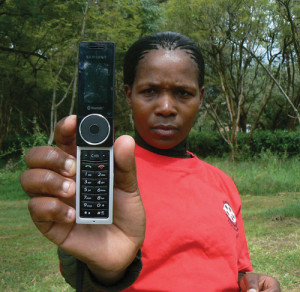The boom in mobile telephony industry contributes as much as $56 billion to Africa’s overall economy
A recent report indicates that the mobile industry contributes a total of $56billion to Africa’s economy, representing 3.5per cent of Gross Domestic Product (GDP) in the continent.
Mobile connections in the Africa continent crossed the 720 million mark, representing approximately 63 per cent penetration.
Over the past 10 years, the number of mobile connections in Africa has grown an average of 30per cent per year and is forecast to reach 1.5 billion by the end of 2020. Africa has overtaken Latin America to become the second largest mobile market in the world, after Asia.
The rate at which mobile connection was growing on the African continent it is expected to reach 950 million by 2016, representing 85 per cent penetration. It is estimated that the industry employs some five million people on the continent.
In Ghana there are more than 21 million mobile connections, representing a penetration of almost 88 per cent, and the sector alone constitutes two per cent of GDP, 7 per cent of investments and 10 per cent of government income. It provides some 6,000 direct jobs and 1.5 million indirect jobs in Ghana.
 Inspite of the growth on the continent, there still remained a huge untapped potential for penetration in the continent, as 36 per cent of people living in the 25 largest African mobile markets still have no access to mobile services.
Inspite of the growth on the continent, there still remained a huge untapped potential for penetration in the continent, as 36 per cent of people living in the 25 largest African mobile markets still have no access to mobile services.
Projections indicate that raising the whole region to 100 per cent mobile penetration could add an additional $35 billion in aggregate GDP to the region, equivalent to a further 2 per cent increase. Even though the mobile industry remained an enabler and catalyst for development beyond its domain on the continent, fierce competition continue to drive down prices, and increased penetration.
Price wars had been common across the continent – between 2010 and 2011 operators reduced prices by an average of 18 per cent. Almost 96 per cent of subscriptions were pre-paid with voice services currently dominating, however the uptake of data services is increasing rapidly.
For example in Kenya, data revenues, including SMS, have increased at a remarkable 67 per cent over the last four years and now represent 26 per cent of total revenues for the industry.
However, despite the downward trend in pricing, the mobile industry continued to enable and support growth in agriculture, banking, education, healthcare, and gender equality through Mobile Value-Added Services (VAS) launched throughout the continent.
The emergence of mobile money transfers and mobile banking puts Africa firmly at the forefront of the global Mobile Money industry. Beyond mobile services, the mobile industry is also contributing to rural electrical distribution with lower carbon emissions and facilitating the work of NGOs across the continent.
African governments are slowly shifting to more transparent ICT regulation, but limited spectrum availability remained a key barrier to sustaining long term growth. It therefore proposed that for the mobile industry to continue to serve as a catalyst for growth, sufficient spectrum was needed for the provision of mobile broadband services. African countries have currently allocated considerably less spectrum to mobile services than developing countries in Europe, the Americas and Asia.
Allocating the Digital Dividend spectrum to mobile services will enable the mobile industry to accelerate its efforts to bring connectivity and information to large swathes of rural Africa.
By working in partnership, mobile operators and African governments can continue the remarkable growth story of the African mobile industry. The benefits that mobile services have already brought to hundreds of millions of Africans can be extended to those who have yet to connect – by so doing, the African continent can continue to bring not only communication services, but also improved financial services, healthcare and education to its people and drive an increase in the economic wealth and development.















